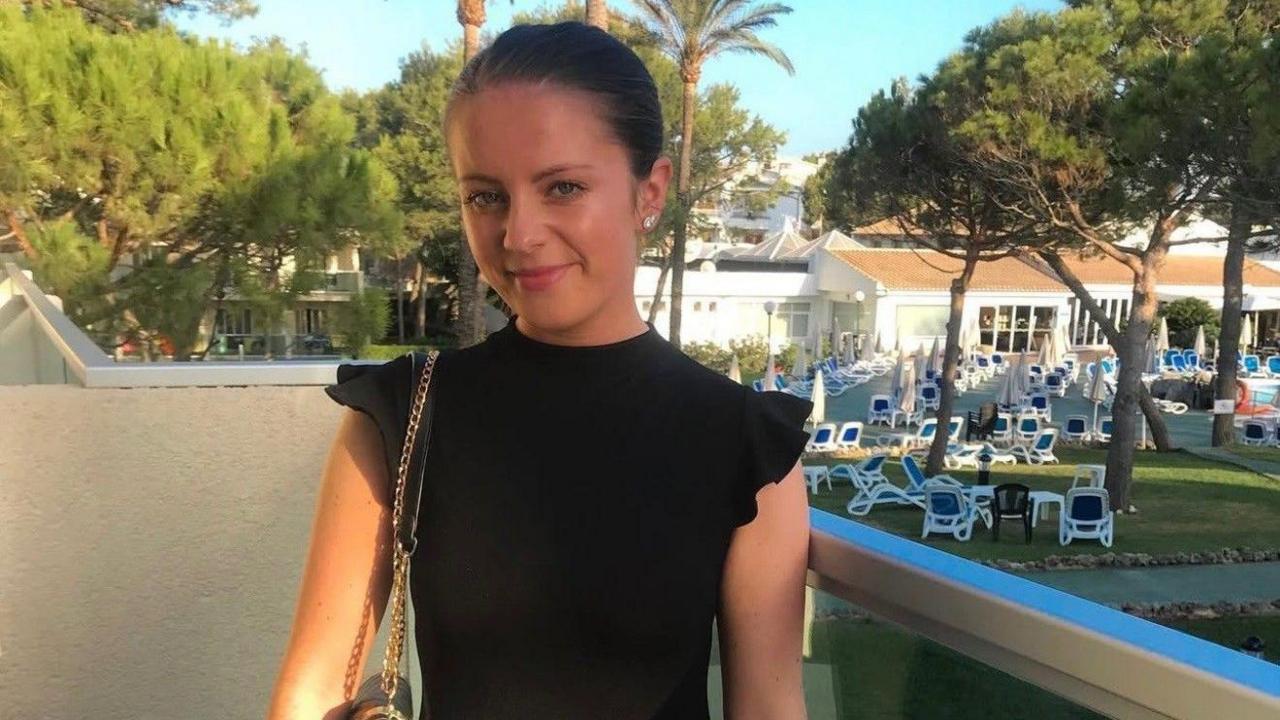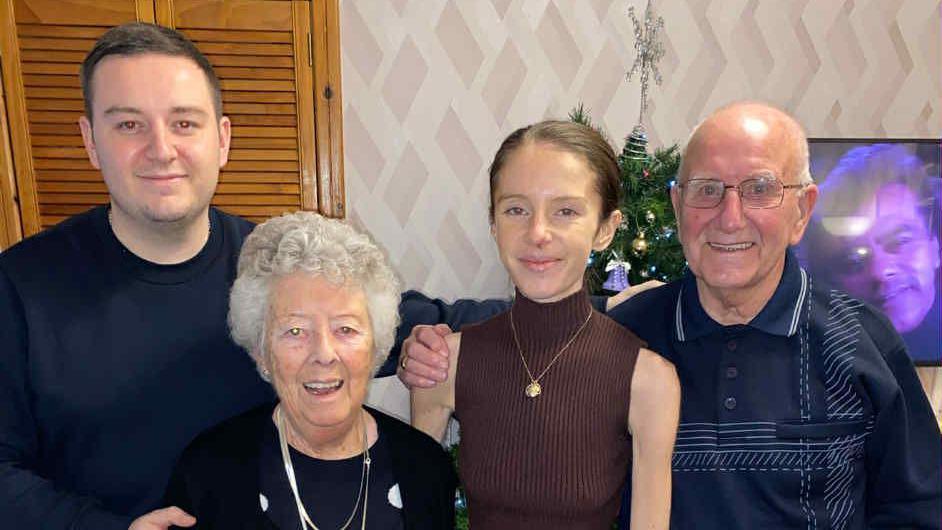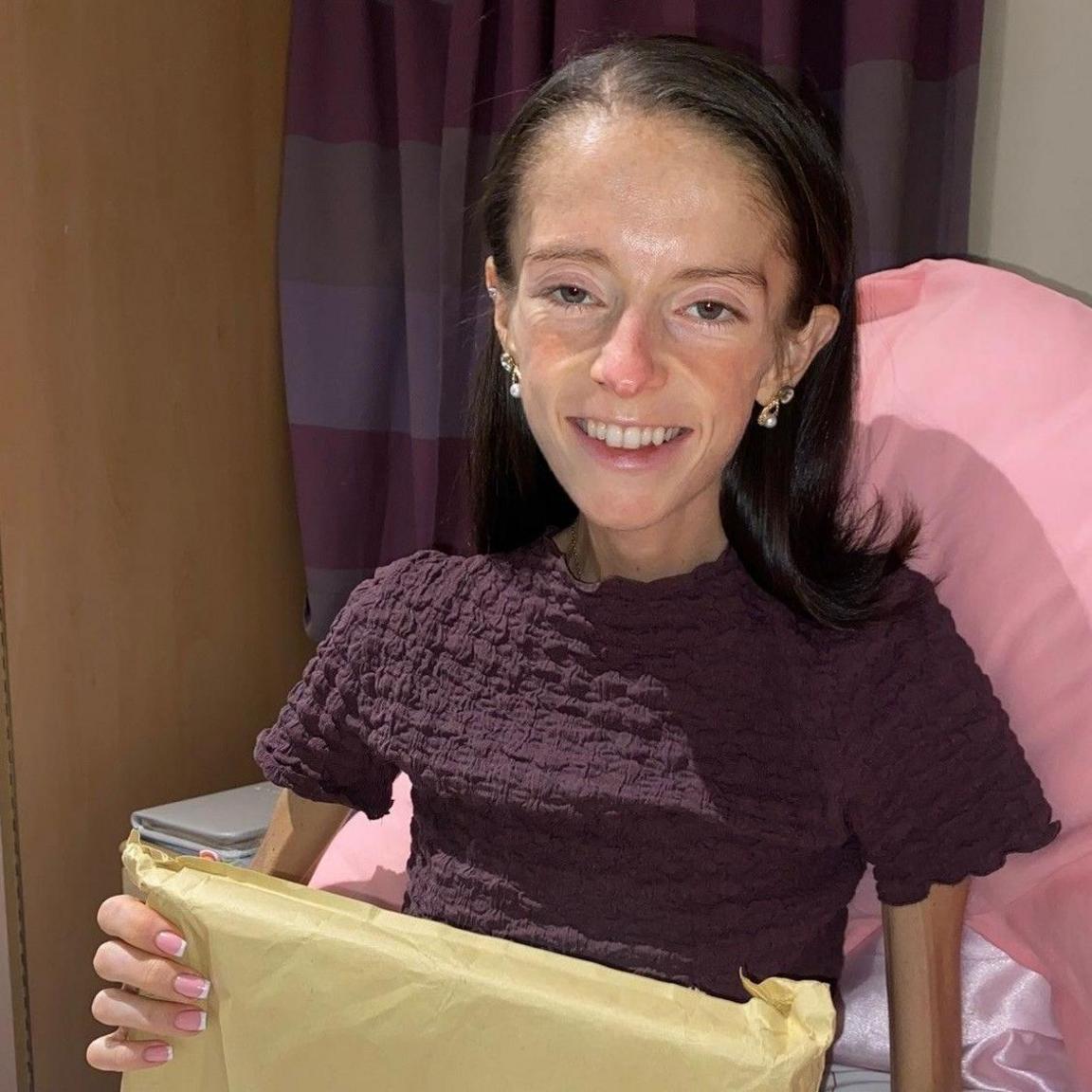'Eating disorder myths made it harder for me to graduate'
Hayley Morrison graduated with a degree while battling an eating disorder
- Published
Warning: This article contains an account of living with an eating disorder that some readers might find upsetting
In a TikTok video with more than seven million views, it seemed like Hayley Morrison had overcome her eating disorder and walked off into the sunset.
In December, the University of Glasgow shared a video where the 26-year-old told how anorexia forced her to take two years out of university.
After she tearfully watched her fellow Spanish students graduate without her, Hayley bought a sparkly pair of shoes and promised she would wear them if she ever finished her degree.
The video cuts to Hayley waiting in line to receive her honours degree on graduation day, smiling and kicking her heel out behind her dark robes.
It's a heart-warming moment - but the university posted the video months after her summer graduation took place.
While she was receiving hundreds of comments and messages congratulating her on recovery, she actually faced being forcibly hospitalised and weighed little more than four stone.
"It wasn't just a sad story with a happy ending," she told BBC Scotland News. "The reality is a bit more nuanced. "

Hayley, pictured on holiday in 2019, before she was diagnosed with anorexia
Hayley, from Elderslie in Renfrewshire, said she began fixating on eating and her weight during the Covid pandemic.
She had returned home from a year studying abroad in Spain in April 2020 and spent the summer working in a supermarket.
"I just put myself into studying and working crazy shifts to avoid everything else," she said.
"I noticed I was losing weight but it's a very hard spiral to get out of and stop. It made me feel in control and safe.
"But at the end of the day, you're not in control - it's in control of you. But it's very hard to see that when you're in it."

Hayley said she was lucky to have support from her family
By Christmas that year her family were shocked by how much weight she had lost.
When she eventually agreed to see a doctor in February 2021, she was diagnosed with anorexia and referred to the adult eating disorder service.
But things took a turn when she was hospitalised for three weeks at the end of July 2021.
"I felt it was a very dehumanising experience and all focused on your weight, with not a lot of psychological help," she said.
"You can struggle at any size and I think that's where a lot of the problems lie when it comes to eating disorders."
Hayley said that her weight went up and down after she was discharged but she often felt that the psychological side of her illness wasn't prioritised.
'Begging for help'
In 2023, she managed to restore some weight but found it "super challenging mentally".
She added: "When you start living in a smaller body, you get used to it. And when smaller bodies are praised nowadays, it's really hard to gain weight and adjust."
And despite her objections, Hayley was discharged from the adult eating disorder services in March 2024.
She said she struggled to cope without the support, so a week later she asked her GP to refer her back.
"Those few months in between, I really do not know how I got through it," she said.
"I felt as if I was begging for help but because I looked ok, I felt as if I was just being ignored."
Kerri Fleming, head of services at the UK's eating disorder charity Beat, external, said there could sometimes be a lack of importance put on the mental side of recovery in eating disorder services because physical recovery "ticks a lot of boxes for people".
She added: "While weight restoration is a really important part of treatment, it's psychological recovery that is really key and this can typically lag behind the physical recovery."
She said that people presenting with an eating disorder while at a healthy weight can often feel "invalidated" by services, friends or family due to the stereotypical image associated with the illness.

Hayley said it was a battle to finish her degree but she had support from lecturers
Hayley said the University of Glasgow was very supportive throughout her degree.
"I don't know how I did it but I persevered and submitted my dissertation and did my exams with so much help from the university.
"My brain just was not functioning but I did it. So the graduation day meant the world to me and my family.
"I never thought I would be smart enough or strong enough to walk across the graduate stage. I took the long way round, but I still got there."
However, she said she was still controlling her food intake and struggling beneath the surface.
"Then four or five months later I was in hospital a few days away from my heart stopping," she said. "It just shows how recovery isn't linear."
Kerri Fleming from Beat echoed this, adding: "There are peaks and troughs.
"In that rollercoaster journey, it's ok if there are periods of what feels like a relapse. Setbacks don't mean relapse, setbacks just mean noticing the behaviour and getting yourself out of it again."
She said recovery was always possible and people with an eating disorder can "regain the life that they had and the life that they want".

She had to wear four or five layers just to stay warm
By November, Hayley was struggling to walk or lift her arms because her muscles had worn away and she would wear several layers to keep warm.
Her condition grew worse and worse until her mum called an ambulance.
Hayley was taken to hospital weighing just four and a half stone (29kg).
"They said they didn't know how I was still alive or functioning," she said. "I was in a really bad way.
"I'd tried so hard and all my family were doing all they could but it just consumed me and I just couldn't make the changes on my own."

Hayley was hospitalised weighing little more than 4st
She was later admitted to hospital and placed in a psychiatric ward.
Hayley added: "They were all over me when I got there and I just thought - where was all this help six months ago when I needed it?
"It's taken me to almost lose my life for people to start taking an interest. It really did just feel like a huge slap in the face."
She said she spent Christmas Day and New Year in the hospital with a nurse barely more than a couple feet away at all times.

Hayley, pictured with her brother, hopes she will recover from her eating disorder
In January, she was discharged and continued her treatment by attending the eating disorder clinic and her local mental health team.
"I just told them that things have to be different this time," she added.
The support has been better for her this time around, and Hayley said she was lucky to have a supportive family.
Ms Fleming from Beat said it was essential for people with an eating disorder to have a well-rounded support network in place to ensure that progress won't just stop.
Hayley added: "But at the end of the day, it comes from me. I'm the one that has to do it and I have to make the decision every day.
"(Anorexia) numbs you and it numbs your feelings and blocks everything else out of your life.
"That's why my degree and the video meant so much, because I know what this illness has stripped me of."
If you have been affected by any of the issues raised in this article help is available via the BBC's Action Line page.